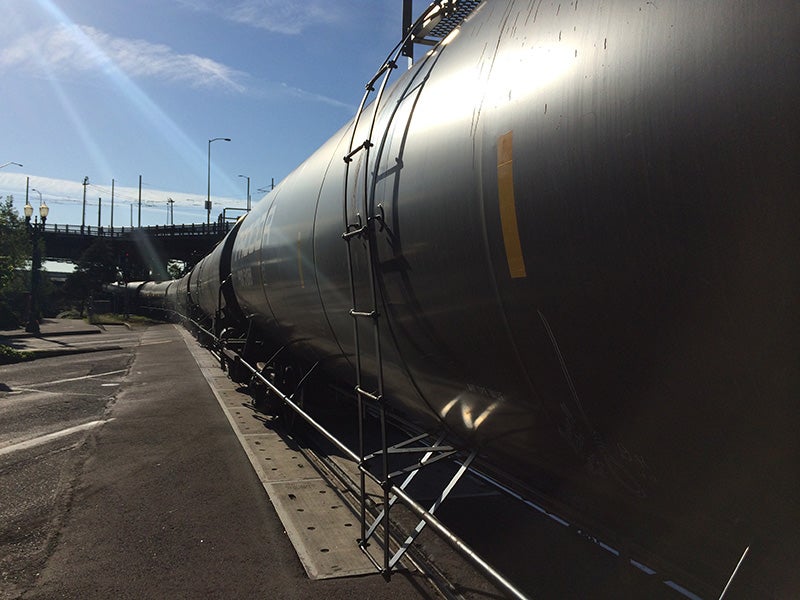Lawsuit Urges Halt to Clatskanie Oil Terminal’s Violation of Clean Air Act
Dangerous Bakken oil shipped at facility places Pacific Northwest’s air and water at risk
Contact
Today, conservation groups filed a lawsuit asking a federal court to require a Columbia River crude oil transport terminal to comply with federal laws meant to protect people and the environment from air pollution. The former ethanol production facility in Clatskanie, OR, has been quietly transformed into a terminal for the transport of millions of gallons of highly explosive Bakken crude oil.
Today’s lawsuit charges Cascade Kelly Holdings and its owner, Global Partners LP, with trying to skirt Clean Air Act protections and avoid strict federal permit requirements while converting a bankrupt ethanol facility, constructed with tax dollars, into a high-volume Columbia River shipping terminal for extremely volatile crude oil.
“Global Partners and Cascade Kelly are trying to game the system and use a facility permitted for ethanol production to ship dangerous crude oil through our backyards without telling the public, doing the proper analysis, or having proper Clean Air Act pollution controls,” said Marla Nelson with Northwest Environmental Defense Center.
The offloading of crude from trains to tanks and then barges at the terminal emits large quantities of volatile organic compounds and other air pollutants harmful to human health and the environment. The suit seeks penalties and a court order requiring Cascade and Global to cease operations at the oil terminal until they obtain the appropriate Clean Air Act permit.
“We cannot allow these companies to skirt the requirements of one of our most important and longstanding protections for communities faced with dangerous industrial pollution,” said Janette Brimmer of Earthjustice, which is representing the organizations. “This legal action ensures that everyone follows the law, not least, oil companies that seek to profit by shipping dangerous products across our treasured landscapes and neighborhoods.”
Global has been moving dangerous, highly-volatile Bakken crude oil from North Dakota on trains (prone to explosion and fire) through the Columbia River Gorge, Portland, and other towns to the Clatskanie terminal at a rate of 300 million gallons in 2013, with no federal permit controls. Global intends to move at least 10 times more oil than that in the near future.
“Transporting volatile Bakken crude by rail and ship along the Columbia River is like playing a dangerous game of environmental roulette with our health and our environment,” said Tanya Sanerib, an attorney with the Center for Biological Diversity. “We want the terminal shut down until we can be sure that people, wildlife and habitat are safe.”
The dangers of transporting Bakken crude oil by train have become painfully obvious to numerous communities over the last year:
- Within the past two months, a derailment in Virginia resulted in a fire in the James River in downtown Lynchburg, jeopardizing the water source for the city of Richmond and wildlife habitats;
- In January, a 122-car train derailed and caught fire near Plaster Rock, New Brunswick, prompting evacuation of the town;
- In December 2013, a train derailed and exploded near Casselton, ND, causing a massive fire that prompted the evacuation of residents in a 5-mile area around the accident;
- Last fall, a train derailed in Alabama, resulting in a fire and spill with significant environmental damage;
- One year ago, the downtown of Lac-Mégantic, Quebec was destroyed when an oil train’s brakes failed, causing it to roll into the town and explode, killing 47 people and polluting the lake that was the lifeblood of the town.
“Our organization works very hard to ensure that Portland residents and surrounding communities are protected from the effects of harmful air pollution,” stated John Krallman of Neighbors for Clean Air. “We seek to ensure that companies like Cascade and Global are not allowed to circumvent the law to the detriment of public health and safety.”
Cascade and Global have already run into trouble with the Oregon Department of Environmental Quality. Using the ethanol facility permit, the companies asked for a “simple technical modification” to the permit to allow the receipt of a small amount of oil. Instead, the companies quickly converted it into a full oil-shipping terminal, exceeding the small amount of oil allowed by the “simple modification” by six times, resulting in Oregon DEQ issuing a penalty order against them.

Additional Resources
About Earthjustice
Earthjustice is the premier nonprofit environmental law organization. We wield the power of law and the strength of partnership to protect people's health, to preserve magnificent places and wildlife, to advance clean energy, and to combat climate change. We are here because the earth needs a good lawyer.